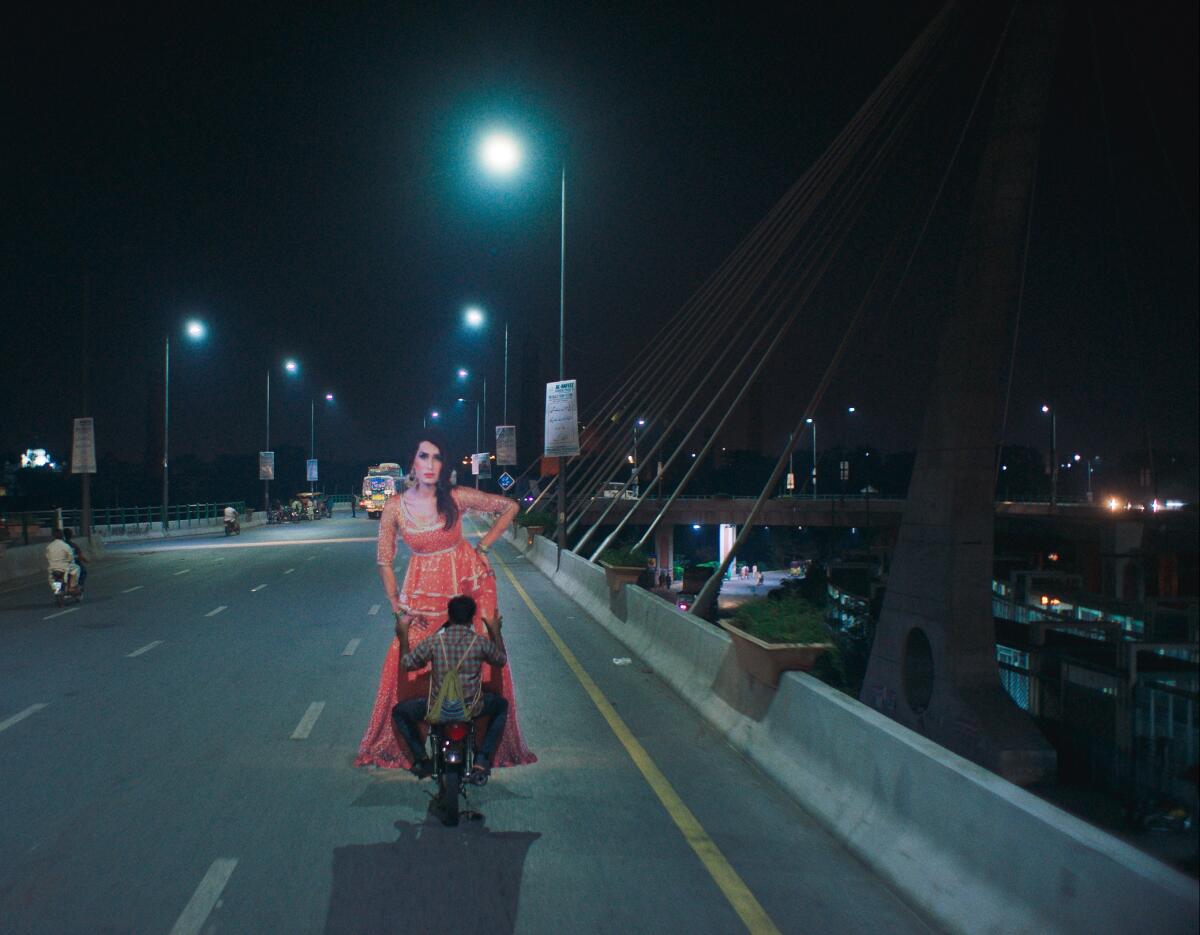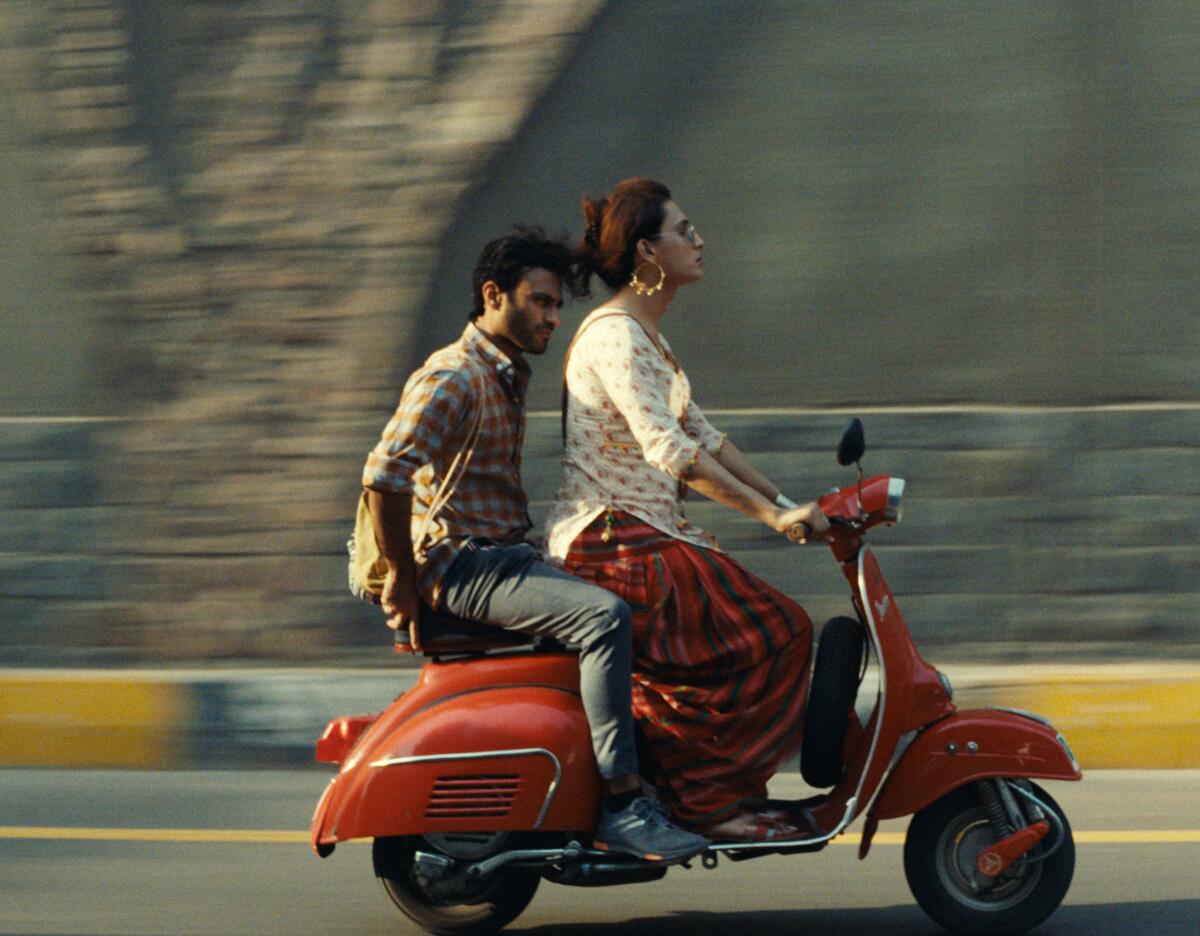Review: ‘Joyland,’ a Pakistani queer-cinema milestone, lays bare the complexity of desire

- Share via
It’s one of the many resonant pleasures of “Joyland,” a visually arresting, politically forceful melodrama from Pakistan, that you’ll spend the early going figuring out exactly who its characters are — in and of themselves, and also in relation to each other. There’s Haider (Ali Junejo), the mild-mannered young man we first see roughhousing with three kids (and hiding under a sheet that, in a slyly suggestive image, obscures his figure and gender). But as we soon realize, those girls aren’t his daughters; they’re his nieces. The tired-looking woman who’s just gone into labor isn’t his wife; she’s his sister-in-law, Nucchi (Sarwat Gilani), though with her husband nowhere in sight, it’s Haider who rushes her to the hospital to give birth to her fourth child.
There’s a subtext to all this confusion: Appearances can be deceptive, and individual roles are seldom as rigidly circumscribed as people would like to believe. That’s especially true of this close-knit Muslim family in Lahore, where three generations dwell under the same roof, two couples are tasked with providing for nine people and children are forever getting underfoot. The father of those children is Haider’s older brother, Saleem (Sohail Sameer), a gruff, bullying upholder of the patriarchy and the closest thing “Joyland” has to an outright villain. Along with his aging, acerbic father (Salmaan Peerzada), Saleem sneers at Haider for being an unemployed househusband to his breadwinner wife, Mumtaz (Rasti Farooq), who happily works in a salon and has no desire for children.
But if Haider and Mumtaz’s marriage is an affront to familial expectations and social and religious norms, Saleem and the others aren’t above milking the benefits, namely Haider’s 24/7 availability as a babysitter to his nieces and caretaker to his father. That’s very much to the movie’s point, which is that a rigidly doctrinaire view of the world isn’t just oppressive or hypocritical, but impractical — a point that becomes ever clearer when Haider, unable to find “respectable” work, lands a job at a local erotic dance theater. Knowing how quick his family is to shame and judge, he tells them he’s been hired as a stage manager; in truth, he’s one of six background dancers for Biba (Alina Khan), a young transgender performer. And as luck and drama would have it, Biba awakens something in Haider and in her audiences (us included) with her galvanic stage presence, her electrifying dance moves and her fearless indifference to the judgments of those around her.
“Joyland,” for its part, has been subjected to more than a few judgments since it premiered at the Cannes Film Festival last May. A strong debut for the writer-director Saim Sadiq, it was the first Pakistani feature ever to premiere in the festival’s official selection, and thus the first Pakistani feature to win two of the festival’s prizes. Months later, it became the first Pakistani entry to be shortlisted for the international feature Oscar, though it wasn’t ultimately nominated. Despite or perhaps because of these precedents, “Joyland” also became a predictable magnet for outrage and was briefly banned from Pakistani theaters last year for its “highly objectionable material” — or, to put it another way, its richly textured, effortlessly compassionate portrait of LGBTQ identity and desire.

But if its sympathies and its politics are unsurprising, the movie itself seldom lapses into obviousness. Haider’s yearning for Biba is intense and undeniable, especially in contrast with his affectionate but passionless marriage to Mumtaz. (That Haider and Mumtaz must constantly share a bed with one of their nieces doesn’t help.) But Haider’s sexuality isn’t given an easy label, and Biba, played with bracing intelligence by Khan, is finally too large a presence to be squeezed into the role of love interest or liberator. And I do mean large: The movie’s wittiest image finds Haider stashing an enormous cardboard cutout of Biba on his family’s rooftop, not realizing that his attempt at discretion will ultimately turn her into a literal queer-visibility poster child.
The backstage burlesque-hall shenanigans hold some interest, especially when Biba exchanges delicious insults with a rival performer or, in a rousing scene, rebukes the transphobia among her own dancers. But you’ll wait in vain for the moment when Haider’s double life as a silver-sequin-bedecked entertainer is humiliatingly exposed. Notably, the real drama here plays out not onstage, but at home, a world whose deep, vibrant colors spring to life in the cinematographer Joe Saade’s boxily framed, intricately shaded images. It’s here that the movie’s attention meaningfully shifts from the men to the women, from Haider to Mumtaz, as she’s forced to give up a job she loves and take over her husband’s domestic duties. Notably, her sexual frustration is treated with no less compassion in a movie that continually acknowledges the ferocity of female desire, especially in a society that would prefer it didn’t exist.
Women are this movie’s greatest source of fascination, whether it’s Biba, weaving her way through the margins of a society that refuses to make room for her, or Fayyaz (Sania Saeed), an emotionally neglected older neighbor who becomes, in her briefly seen interactions with the family, a figure of remarkable pathos. Most moving of all is the sister-in-law rapport between Nucchi and Mumtaz, terrifically played by Gilani and especially Farooq, as they come to understand each other in ways their husbands never will. The story’s most joyous sequence finds them on a ride at an amusement park (the one that gives the movie its title) and screaming in delight — a moment of pure, exhilarating yet tragically fleeting release.
‘Joyland’
In Urdu and Punjabi with English subtitles
Not rated
Running time: 2 hours, 6 minutes
Playing: AMC Burbank 16; Landmark’s Nuart Theatre, West Los Angeles
More to Read
Only good movies
Get the Indie Focus newsletter, Mark Olsen's weekly guide to the world of cinema.
You may occasionally receive promotional content from the Los Angeles Times.











